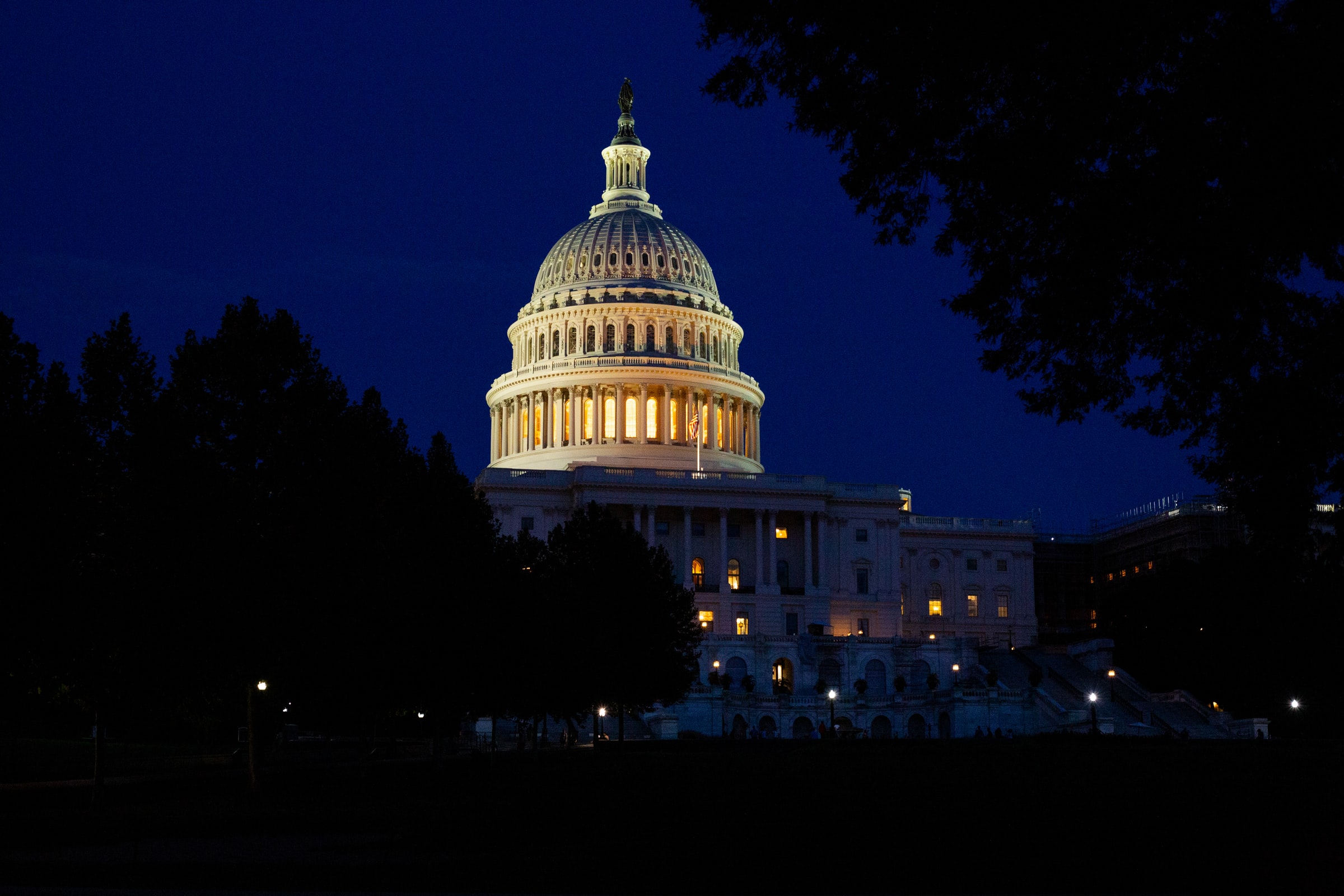“Adults in a Room” is a series in collaboration with The Atlantic Council’s New American Engagement Initiative (NAEI). The series stems from NAEI’s monthly networking events that call on analysts to gather virtually and hash out a salient topic. The goal of this series is to give you a peek into their Zoom room and a deep understanding of the issue at hand in less than the time it takes to sip your morning coffee, without the jargon, acronyms, and stuffiness that often come with expertise.
What were the experts talking about this October? Congress has a constitutionally mandated role in US foreign policy. It has the power to declare war, decide how much money to put toward the military, and is responsible for overseeing the conduct of the executive branch in all issues of foreign policy. Congress, however, seems to have given up its important role in how the US engages with the world. Why is that? And what can be done to reassert its authority in this space?
The Atlantic Council’s New American Engagement Initiative’s (NAEI) October networking event brought together a number of experts to discuss the role of Congress in US foreign policy. Those in the room saw many areas where Congress could provide more oversight while recognizing that there remain significant roadblocks to it doing so. One of the major impediments is the degree of turnover of members of Congress and their staff, which leads to a loss of institutional knowledge of how these complex systems operate and how they can be managed. Yet, recent developments in Congress indicate that it is beginning to reclaim its important position as a check on the executive branch in the realm of foreign policy. Efforts to stop supplying weapons used in the war in Yemen, the campaign to repeal the Authorizations for Use of Force, and more critical views of the nebulous defense budget, all signal bipartisan desire for Congress to assert its rightful authority.
Three participants expanded on their thoughts on the state of congressional oversight of US foreign policy and where things may be headed:
Mandy Smithberger, Director of the Center for Defense Information, Project on Government Oversight
It’s been encouraging to see Congress increasingly interested in reasserting itself as a coequal branch in the foreign policy arena, most recently with the bipartisan introductions of the National Securities Powers Act in the Senate and the National Security Reforms and Accountability Act in the House. Congress can — and should — be doing significantly more to exercise the significant powers it already has to conduct oversight over our foreign policy.
While many focus on assessing Congress by bills passed, there are a number of other tools members have in their arsenal to expose and bring accountability to foreign policy missteps. Confirmation hearings, appropriations riders, letters, public events, Congressional Research Service (CRS) memos, and even their own websites can be used as tools to increase transparency about the operations of the federal government. Accountability, on the other hand, requires Congress to effectively use its bully pulpit to expose wrongdoing and to have the tenacity to hold agency officials accountable. More importantly, when Congress does exert its oversight duties, it should back up these efforts to ensure compliance with its subpoenas either through a new judicial fast track procedure or reviving their inherent contempt.
Congress seems to have given up its important role in how the US engages with the world. Why is that? And what can be done to reassert its authority in this space?
The ability to exercise these tools is atrophying, however, as Congress struggles with staff retention problems that have only become worse since the Jan. 6 insurrection. Funding is one of the biggest problems. Despite exploding executive branch spending, the budget for the legislative branch has significantly lagged. To the degree there’s been growth, Demand Progress found that the budget for Capitol Police grew at a rate 10 times higher than the rest of the legislative branch. Congress isn’t using those limited resources well, either, since both the House and the Senate have decreased their policy staff hiring to prioritize constituent services and press. Any increases should come with a commitment to hiring more policy experts and investigators. Executive branch agencies know that inexperienced staff often won’t challenge them, and that in too many instances they can wait out a congressional request for information because the staff will either be gone or onto another issue before they follow up.
Insufficient professional development resources for staff presents another significant challenge. To help make up for that shortfall my organization, the Project On Government Oversight, created an oversight training program for legislative branch staff in 2006. What began as monthly trainings has now expanded to include targeted briefings for personal office and committee staff and biannual bootcamps hosted with the Levin Center at Wayne State Law School and the Lugar Center.
Oversight work is tough and rarely provides instant gratification, but it can also make a real difference in curtailing waste and corruption and blocking bureaucracies that retaliate against war heroes for exposing uncomfortable truths. Oversight also means being open to views outside of agency orthodoxy, including inspectors general. Civil society can and should support this work if we want to have a foreign policy that is accountable and serving our country’s interests.
Christopher Preble, Co-director, New American Engagement Initiative
Given the state of US democracy today, with the two major parties unable to agree on even the most basic functions of government, it is easy to get discouraged. Yet, there are grounds for cautious optimism with respect to Congress fulfilling its constitutional responsibilities and reasserting its oversight of the executive branch.
For one thing, the recent moves to end US support for the brutal war in Yemen have enjoyed bipartisan support, with Senator Mike Lee (R-UT) joining forces with Senators Chris Murphy (D-CT) and Bernie Sanders (I-VT). Similarly, Representatives Jim McGovern (D-MA) and Peter Meijer (R-MI) have co-sponsored legislation to rein in executive power, including over the use of force, weapons sales, and the use of emergency declarations. Legislation, however, can get bogged down or be vetoed by presidents anxious not to give up any of their power. The executive branch cannot so easily block requests for information. Indeed, even a few determined members can call hearings or request investigations to uncover malfeasance, corruption, or incompetence. They can also ask the CRS to study a particular issue.
The need for answers is especially acute with respect to the 20-years-long US war in Afghanistan. Today, there is a young cadre in the House and Senate, including a number of Iraq and Afghanistan war vets, who are willing to ask hard questions. We should celebrate such efforts, and, in general, encourage Congress to be more proactive.
Marie Harf, Executive Director of External Relations and Marketing, Georgetown University
The politics of foreign policy are changing. Increasingly, members of Congress are challenging the status quo that has governed America’s role in the world for decades, from the nature of our alliances, to relationships with adversaries, to the use of force. Policy positions anathema only several years ago (but which are arguably outdated) suddenly have legislative constituencies. For example, members are now seriously questioning the behavior of long-time allies, such as Israel, recognizing the reality that the peace process is dead and the situation on the ground risks solidifying as an apartheid state. Some members are also questioning the importance of partners like Saudi Arabia, where energy and security needs have historically trumped a real concern about human rights or the wisdom of massive arms sale, something the war in Yemen has fundamentally changed.
These new dynamics present opportunities for lawmakers on both sides of the aisle to re-engage in foreign affairs with fresh perspectives, ones that are frequently more in line with public opinion. The Biden administration has received some criticism for not bringing Congress back into the foreign policymaking process more quickly. There are many explanations for this, but the lasting scar tissue that Obama-era officials, many of whom are now back in government, carry from Congress’s abdication of its role in deciding whether to attack Syria in 2013 cannot be overstated.
After Syrian President Bashar al Assad used chemical weapons on his own people, members of Congress voiced outrage at two things: a) that the US might fail to act; and b) that they believed the executive branch was ignoring Congress as it grappled with this decision about whether to use force. Yet, these members suddenly balked when President Barack Obama asked them to take a politically-difficult vote. The administration understandably felt undermined on the world stage, and the relationship with Congress was soured, almost irreparably in some cases.
This, however, was eight years ago, which is a lifetime in Washington. As more diverse and more assertive members willing to challenge the foreign policy status quo are elected, there is real space for new political alliances on the Hill that could lead the way in re-asserting Congress’ duties as an equal branch.





















